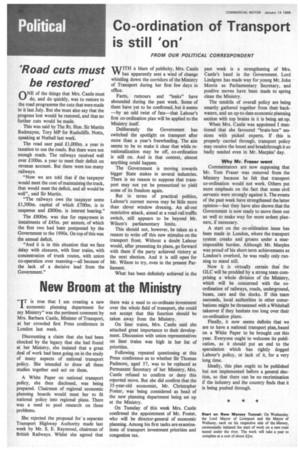Co-ordination of Transport is still 'on'
Page 32

If you've noticed an error in this article please click here to report it so we can fix it.
FROM OUR POLITICAL CORRESPONDENT
WITH a blare of publicity, Mrs. Castle has apparently sent a wind of change whistling down the corridors of the Ministry of Transport during her first few days in office.
Facts, rumours and "leaks" have abounded during the past week. Some of them have yet to be confirmed, but it seems —by an odd twist of fate—that Labour's first co-ordination plan will be applied to the Ministry itself.
Deliberately the Government has switched the spotlight on transport after more than a year's freewheeling. The aim seems to be to make it clear that while renationalization may be off, co-ordination is still on. And in that context, almost anything could happen.
The Government is moving towards bigger State stakes in several industries. There is no reason to suppose that transport may not yet be pressurized to yield some of its freedom again.
But in terms of practical politics, Labour's current moves may be little more than clever window dressing. An all-out restrictive attack, aimed at a road-rail traffic switch, still appears to be beyond Mr. Wilson's parliamentary limits.
This should not, however, be taken as a reason to write off this new stimulus on the transport front. Without a doubt Labour would, after presenting its plans, go forward with them if the party achieved victory at the next election. And it is still open for Mr. Wilson to try, even in the present Parliament.
What has been definitely achieved in the past week is a strengthening of Mrs. Castle's hand in the Government. Lord Lindgren has made way for young Mr. John Morris as Parliamentary Secretary, and positive moves have been made to spring clean the Ministry.
The tendrils of overall policy are being smartly gathered together from their backwaters, and an up-to-date economic planning section with top brains in it is being set up.
When Mrs. Castle was appointed I mentioned that she favoured "brain-box" sessions with picked experts. If this is properly carried through, transport policy may receive the boost and breakthrough it so badly needed even in Mr. Marples' day.
Why Mr. Fraser went
Commentators are now supposing that Mr. Tom Fraser was removed from the Ministry because he felt that transport co-ordination would not work. Others put more emphasis on the fact that some civil servants were strongly against it. The events of the past week have strengthened the latter opinion—but they have also shown that the Government is now ready to move them out as well to make way for more ardent planners, if necessary.
A start on the co-ordination issue has been made in London, where the transport system creaks and groans under a nearimpossible burden. Although Mr. Marples was proud of his short-term achievements as London's overlord, he was really only running to stand still.
Now it is virtually certain that the GLC will be prodded by a strong team comprising a whole division of the Ministry, which will be concerned with the coordination of railways, roads, underground, buses, cars and the docks. If this team succeeds, local authorities in other conurbations might be threatened with a Whitehall takeover if they hesitate too long over their co-ordination plans.
Finally, it now seems definite that we are to have a national transport plan, based on a White Paper to be brought out this year. Everyone ought to welcome its publication, as it should put an end to the speculation which has rightly dogged Labour's policy, or lack of it, for a very long time.
Ideally, this plan ought to be published but not implemented before a general election, so that there can be no recrimination if the industry and the country finds that it is being pushed through.
Start on New Mersey Tunnel: On Wednesday the Lord Mayor of Liverpool and the Mayor of Wallasey, each on his respective side of the Mersey, ceremonially initiated the start of work on a new road tunnel under the river. The work will take a year to complete at a cost of about firn.
















































































































































